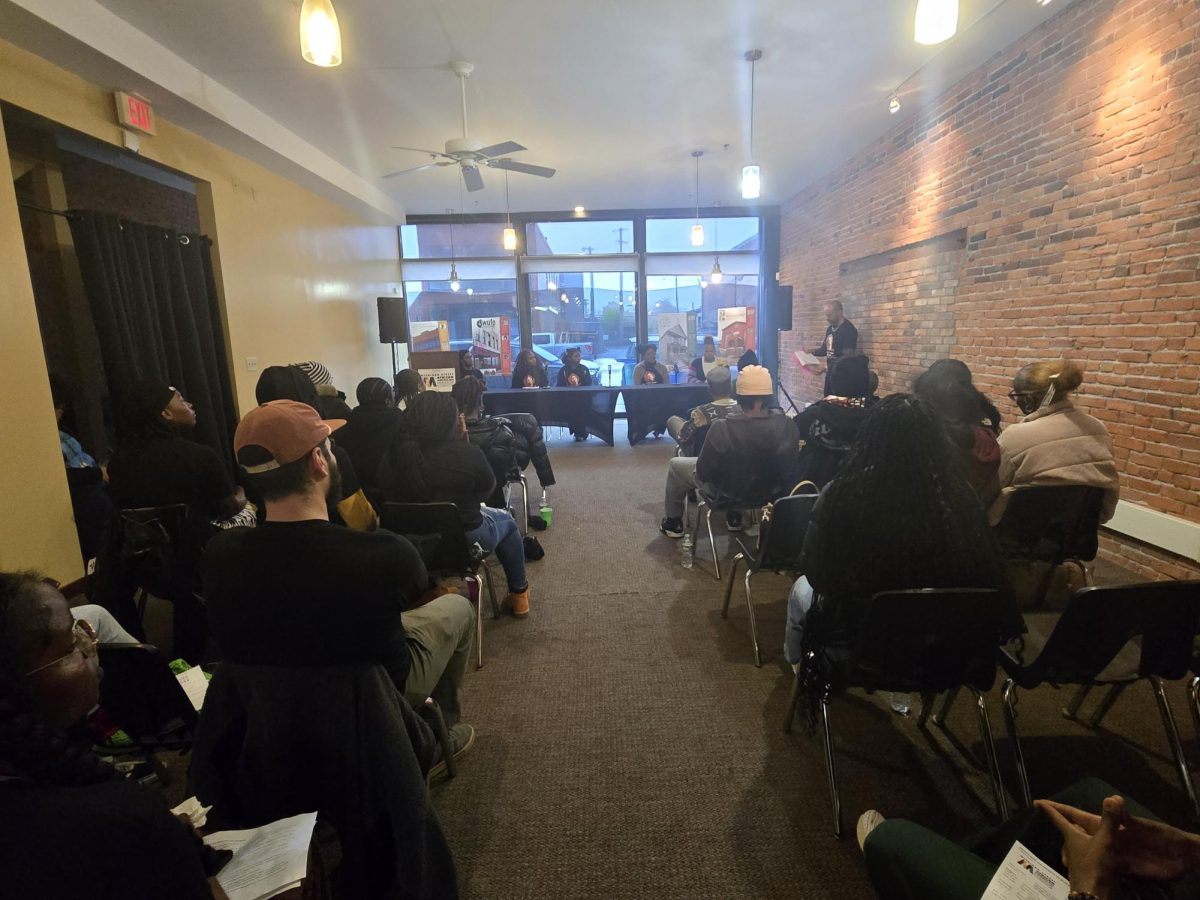Is the Academy over-compensating to avoid controversy?
With the Academy Awards set to air this Sunday, Reuben Wolf asks: Were too many minorities nominated in the wake of last year’s controversy?
February 24, 2017
Last year’s #OscarsSoWhite controversy brought to light the unchanging institutionalized racism Hollywood has been trying to move past for an undefined number of years. For as long as Hollywood has been the movie production capital of America, people of different races, ethnicities and nationalities have been given the shaft, especially when it comes to the Academy of Motion Pictures Arts and Sciences Award ceremony, otherwise known as The Oscars or the Academy Awards. Speaking as someone who always watches the Oscars, I still haven’t got over Meryl Streep beating out Viola Davis for Best Actress in The Iron Lady in 2012, even though Viola Davis carried The Help to be a passable film solely on her talented shoulders.
While this last moment was not pegged on the “racism” totem pole, the Academy has always been self-aware of the racism that exists and sometimes seems to give awards to minorities in hopes that it will bring the winds of change toward ending any controversy. Hattie McDaniel won Best Supporting Actress in 1940 for Gone With the Wind despite being seated all the way in the back of the auditorium; in 1964, Sidney Poitier beat out the likes of acting legends Richard Harris, Rex Harrison, Albert Finney and Paul Newman to become the first Black man to win Best Actor for Lilies of the Field; in 1991 the Academy finally got to award a film that was pro-American Indian by giving Dances With Wolves the Best Picture award, beating out now-favored Goodfellas; 2002 marked the first time the Academy gave the two lead-acting role awards to two Black people, Halle Berry for Monster’s Ball and Denzel Washington for Training Day; and finally in 2014, 12 Years a Slave, a film centered around possibly the darkest period in Black American history, took home Best Picture.
Yet, this does not seem to be enough for some people. Spike Lee is famous for his irrational anger towards parties where it is rather unwarranted. However, his anger towards the Academy is probably the most justified of all of his disputes. Lee has continually been snubbed by the Academy, most egregiously in 1989, when Do the Right Thing was hailed by many critics as the best movie of the year. Alas, the Academy only recognized the screenplay and Danny Aiello for Supporting Actor, one of the only white men in the film. This happened again in 1993, when Malcolm X was once again critically acclaimed but only Denzel Washington received a nomination for his portrayal of the titular character.
When the nominations were released last year and not one minority was recognized for their efforts, Lee once again jumped up in outrage, but he only played second fiddle to the widespread controversy that this caused. Of all 20 acting nominations, not one person of different ethnicity was represented even though there were several to choose from. The most notable were Will Smith in Concussion, Idris Elba in Beasts of No Nation, Michael B. Jordan in Creed, or anyone from the critically-acclaimed Straight Outta Compton. In fact, Compton’s only nomination was Original Screenplay, insulting when you see that the film was written by whites.
This year is an entirely different story. In all big-5 categories (that is, Picture, Actor, Actress, Director, and Screenplay) there is at least one minority represented. Some may argue that this year’s nominees are more deserving than any of the snubs from last year. As good as Will Smith was, Concussion was not that good of a movie and sometimes an acting nomination will ride on the overall critical success of the film (e.g., Denzel Washington in The Hurricane); Beasts of No Nation was a Netflix film and the Academy has never recognized an internet-distributed film yet; and as to the rest, it was a pretty stacked year in terms of acting performances all around, minorities weren’t the only snubs last year.
In many ways, those groups that were snubbed last year were much more deserving this year. Hidden Figures and Fences both featured predominantly Black casts that all gave top-notch performances. Lion gave a man of British-Indian decent his second acting nomination and the movie is also up for Best Picture (try not to forget Slumdog Millionaire, even though most of us have). And Moonlight was possibly the most critically acclaimed movie to be released last year and is nominated for everything it deserves.
Already, though, we see a tie to what happened to Spike Lee in 1990 and what is happening here, as if the Academy does not want to repeat the same mistakes. This begs the question: Is the Academy over-compensating this year for that purpose?
This is not to say that those nominated this year are less deserving than some of the other snubs, but there does seem to be a bit of minority-nomination overkill by the Academy. The fact that there is one minority nominated in every category gives off an heir that the Academy is really trying to go out of their way to make everyone happy and avoid controversy. But as I stated before, those nominated this year are far and away more deserving, especially those who find themselves in those minority groups.
Also, this year has seen greater emphasis on films centered around Black issues with Black casts (and with Get Out just hitting theaters, prepare for this to be a recurring, albeit welcome, trend), whereas last year’s snubs seemed to be geared towards individual performances of Black people independent of the film’s focus. So it could be said that the nominations this year may have come from the fact that Black films made more noise.
But unlike last year, the Academy this year chose to nominate films that were not officially screened in theaters for wide-release audiences. People believed Idris Elba got snubbed last year because Beasts of No Nation was a Netflix release, but Ava DuVernay’s 13th received a nod for Best Documentary Feature. This can be chalked up to the over-compensation pile since the Academy barely gave DuVernay’s last feature, Selma, any love (also no thanks in part to a terrible marketing campaign) much to the chagrin of many film critics and minority groups.
On the same plane of thought, Ezra Edelman’s O.J.: Made in America also received the same nomination, airing as part of ESPN’s popular 30 for 30 series. So perhaps the Academy is recognizing films that receive internet-distribution and starting to recognize that the term “Motion Picture” that is part of their name is all-inclusive independent of where and how a film is distributed.
It’s tough to say what really is going through the Academy’s mind when it comes time to vote. The results have always been kept under the tightest of wraps until the ceremony. But the most alarming statistic we learned of the voters in the Academy was the general makeup, most were older white males. Oddly enough, the whole organization is spearheaded by a Black female, Cheryl Boone Isaacs, who promised that representation of diversity will not be a problem this year. And all of this, keep in mind, is coming just three years after 12 Years a Slave took home Best Picture.
So who knows whether or not Boone Isaacs has ham-fisted diversity down Academy Award voter’s throats, whether the nominations are more deserving than last year’s snubs, or if the Academy is acting out of abject fear of another controversy. Given the lack of any controversy this year, I would be more inclined to side with the latter than any of the former. But I would be foolish to make such a claim before the ceremony actually takes place and awards are given. It is one thing to nominate a film or a person, it is another to award them.
Dealing with race issues in any regard is a tough line to tow. Lee Daniels (The Butler, TV’s Emprie), a homosexual Black director, writer and producer, was rather vocal about last year’s controversy, believing it to be ridiculous. Daniels stated that being in this business for award recognition is silly and just creating your art should be the ultimate goal of your profession in this industry. Daniels is choosing to ignore the racism perpetuated by Hollywood against him thus far. Daniels has also received awards and acclaim for his film. Precious: Based on the Novel ‘Push’ by Sapphire (2009) gave Mo’Nique a surprise Oscar victory for Supporting Actress in 2010. Daniels has seen the fruits of his labor awarded. It’s easy for the victor to be humble rather than the other way around.
There is one thing that is certain in my book: if the effort is good enough, it is worth recognition.
email: wolf.record@outlook.com




